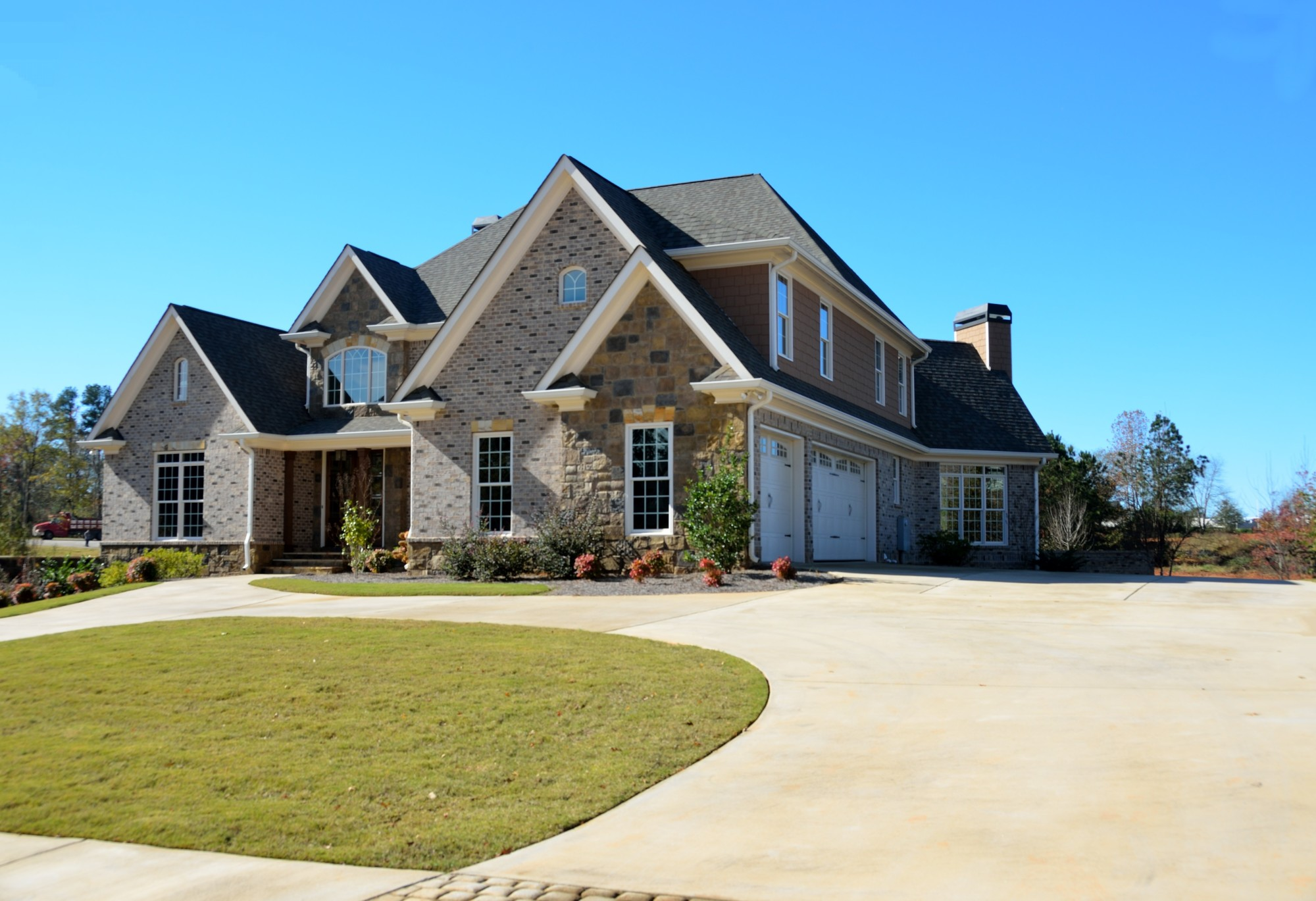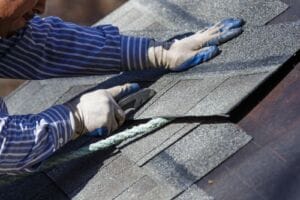If you’re contemplating a concrete driveway, practicality must meet aesthetics when making your choice. How long does it last? What designs cater to your home’s character? And importantly, what costs can you anticipate? This guide covers your options in detail, from sustainable, durable materials to eye-catching finishes, and gives you practical advice on installation, maintenance, and pricing to ensure your driveway stands the test of time.
Evaluating Your Concrete Driveway Options
When it comes to driveways, concrete is a classic choice that offers robust durability compared to alternatives like asphalt. With proper care, concrete driveways can last up to 50 years, bearing heavier loads and resisting harsh weather conditions. But the strength of concrete driveways doesn’t mean that they can’t be aesthetically pleasing. Decorative concrete options such as stamped and colored concrete not only provide long-lasting durability but also add visual satisfaction and value to homes. However, it’s essential to note that these decorative finishes can significantly raise the cost of a concrete driveway.
Beyond aesthetics and durability, choosing concrete for your driveway also supports environmental sustainability. Thanks to concrete’s longevity, recyclability, and its role in reducing the urban heat island effect, your new concrete driveway can be both attractive and eco-friendly.
Plain Concrete: The Classic Choice
Simplicity has its own charm. Plain gray concrete driveways, with their sleek, clean look and concrete slabs, are a cost-effective and simple option for homeowners. The durability of plain concrete is one of the main reasons homeowners choose this material for their driveways.
With proper installation and care, plain concrete pavements, such as driveways, can withstand heavy vehicle traffic and harsh weather conditions, providing a reliable and sturdy surface for years to come.
Stamped Concrete: Artistry Underfoot
For those seeking a more artistic approach to their driveway, stamped concrete offers a blend of durability and artistry. Stamped concrete driveways can mimic the appearance of stone or wood, adding a unique aesthetic touch to your property. With intricate designs such as concrete pavers, inlaid brick, or wood planks, stamped concrete can significantly enhance the curb appeal of your home.
However, the added beauty comes at a cost, with the national average for a stamped concrete driveway estimated to be between $7,000 and $11,000.
Colored Concrete: A Splash of Personality
If you’re looking to add a splash of personality to your driveway, consider colored concrete. By adding color to the concrete, you can completely alter the visual impact of your driveway and enhance its curb appeal. Homeowners can choose from a broad spectrum of colors and hues, creating a unique and inviting driveway surface that reflects their personal style. However, when selecting hues, it’s important to consider how the chosen colors will blend with the overall property aesthetic and the natural surroundings. Keep in mind that variations in the color of concrete may occur due to multiple loads or placements, and these colors may fade over time.
Understanding Concrete Driveway Installation
Installing a concrete driveway is a multi-step process that requires careful planning and execution. It begins with setting dimensions, preparing the sub-base, reinforcing with steel if necessary, pouring the concrete, and curing the slab. The longevity of a concrete driveway is heavily dependent on the quality of the initial installation and proper site preparation. This includes removing existing pavement, compacting a gravel base, and setting up side forms.
Adherence to local building codes is also essential to ensure a durable and legal installation. These codes determine the standards for workmanship and materials, including the appropriate concrete mix and the installation of control joints.
The Foundation Matters
A solid foundation is crucial for a long-lasting concrete driveway. It begins with:
- at least 100mm of well-compacted hardcore, ensuring stability and longevity
- a leveled soil subgrade before pouring concrete
- even spreading and leveling of the gravel to create a flat surface.
To ensure a firm foundation, the gravel base should be compacted using a plate compactor machine, particularly in areas susceptible to poor drainage or freezing temperatures.
Pouring Perfection
The pouring phase is critical in ensuring that the concrete slab has a uniform and even surface. During this phase, concrete should be distributed using a hoe so that it stays relatively flat and slightly above the form level. Proper pouring techniques can greatly influence the final appearance and durability of your new driveway.
Finishing Touches
Once the concrete has been poured and leveled, the next step is to apply the finishing touches. A concrete broom is recommended to create a textured, non-slip finish on the driveway surface. A bullfloat should be used to remove any irregularities from the concrete surface, ensuring a smooth and level finish.
Before sealing the concrete, it is essential to apply a high-quality concrete crack filler to any significant cracks for a durable finish. These finishing touches not only enhance the look of your driveway but also ensure its longevity.
Concrete Driveway Maintenance for Longevity
Proper maintenance is key to extending the lifespan of your concrete driveway. Regular cleaning and sealing are essential steps to maintain the aesthetics and durability of your driveway. At least once a year, it’s recommended to clean your driveway with water and mild detergent to remove dirt, grime, and other contaminants. To protect your driveway from freeze-thaw conditions, chemicals, and staining, it’s advisable to apply a high-quality sealer periodically.
In addition to cleaning and sealing, here are some other important steps to maintain your driveway:
- Promptly remove snow from the driveway to avoid surface damage.
- Reseal the driveway at least every 15 to 20 years to maintain its integrity and appearance.
- Apply a sealer before the onset of the first winter and periodically thereafter to shield the concrete from oil, stains, and water intrusion.
Following these steps will help keep your entire driveway in good condition over time.
Regular Cleaning and Sealing
Curing concrete is critical for preventing cracks and ensuring long-term durability. The concrete should be cured for at least three days, and extending the curing up to seven days is advantageous if possible. Continuous sprinkling is one of the preferred methods of curing, which should be initiated as soon as possible after finishing operations.
Regularly sealing an exterior concrete driveway can prevent surface damage and extend its lifespan at an affordable cost.
Addressing Cracks and Damage
One of the common issues with concrete driveways is cracking. Immediate repair of visible cracks with appropriate crack repair products is crucial to prevent further expansion due to freeze-thaw cycles or vegetation growth.
Regularly inspecting your driveway for cracks and addressing them promptly can significantly extend the lifespan of your driveway.
Cost Considerations for Your New Concrete Driveway
Concrete driveways can range from $1,800 to $6,000, with the national average around $3,000. However, some data suggests that the range extends to $2,100 to $7,800. The concrete driveway cost is significantly affected by various factors, including the driveway’s size, thickness, design, site preparation, material choices, and complexity of the installation work. To calculate the cost of a concrete driveway, it’s recommended to contact a professional for an estimate based on the specifics of the property, determine the square footage, factor in material costs, and add approximately 40% for labor costs.
Material prices for concrete typically range from $4,375 to $8,000, while labor costs can vary from $2,271 to $9,200. The concrete cost, in terms of general installation, is between $6 and $8 per square foot for a plain finish. However, concrete costs can go from $4 to $16 per square foot depending on the size and complexity, and labor can range from $1.60 to $6 per square foot.
Material and Labor Breakdown
The cost of installing a concrete driveway can vary significantly based on the type of concrete and the complexity of the installation. For instance, installing a standard, plain concrete driveway typically ranges between $4 to $6 per square foot, while a stamped concrete driveway may cost $8 to $15 per square foot depending on the design complexity.
A standard-sized single-car driveway measuring 10 feet by 20 feet can range from $800 to $1,600 depending on the concrete material used. While attempting the installation by oneself could save $2 to $3 per square foot, the potential for costly mistakes due to the project’s complexity often makes it more sensible to rely on professionals for installation.
Additional Features and Customizations
Additional features and customizations can also impact the overall cost of your driveway project. For instance, heated driveways, which help prevent ice buildup in cold climates, can lead to an increase in overall costs, ranging from $12 to $25 per square foot. Stained concrete driveways, which add color and texture, come at an additional cost of approximately $6 to $12 per square foot.
However, to manage the cost of a concrete driveway, refraining from incorporating special features such as reinforcing steel, elaborate drainage systems, or decorative finishes can be beneficial, as these features tend to increase the total price.
Maximizing Durability and Drainage
To maximize the durability and longevity of your concrete driveway, it’s important to consider the following:
- The driveway’s thickness: Ensure that the concrete driveway is thick enough to withstand the weight of vehicles and other heavy loads.
- Proper drainage: Use a gravel base for the driveway to improve drainage and prevent water from pooling on the surface. This can help minimize the likelihood of cracking due to shifting soil.
- Joint placement: Joints are strategically placed in concrete driveways to control the location and spread of cracks. Recommendations suggest a maximum distance of 10 feet between joints for a four-inch slab, with a depth of one inch for these joints.
By considering these factors, you can ensure that your own concrete driveway is built to last and withstand the test of time.
While a standard concrete driveway is typically 4 inches thick, it may need to be thicker to accommodate heavier vehicles or match the thickness of a previously existing driveway. The thickness of a driveway can significantly influence its durability and ability to withstand heavy traffic.
Importance of Thickness
The thickness of a driveway plays a crucial role in its durability, especially if it’s expected to bear the weight of heavy-duty vehicles. To increase durability, rebar is laid in the foundation of a concrete driveway.
If heavy-duty vehicles or equipment are parked frequently on your driveway, it might be necessary to consider a thicker driveway to withstand the weight and prevent damage. This can help maintain the longevity and durability of the driveway over time.
Ensuring Proper Drainage
Proper drainage is critical in concrete driveway design. It can prevent standing water, which can cause surface damage over time. The concrete driveway design should include an adequate slope to ensure water drains off rather than accumulating on the surface.
Installing a trench drain or channel along the edge of the driveway can efficiently capture and direct runoff water away from the driveway. Furthermore, pervious concrete options can reduce runoff and improve drainage by allowing water to pass through the material.
Navigating Permits and Regulations
When planning for a new concrete driveway, it’s important to consider local permits and regulations. Typically, permits are required for construction work, including driveway replacement, depending on local regulations. Projects that involve widening or extending a driveway are more likely to require a permit. However, simple repairs might not need a permit unless they affect sidewalks, curbs, or gutters. It’s always advisable to check with your local building departments, as some localities mandate permits for all actions on driveways, including replacement, alteration, or repair. You may also need to submit plans or specifications for the driveway project and conduct inspections during and after construction to ensure compliance with building codes.
The cost for acquiring a building permit usually falls within the range of $50 to $200, and this fee also includes associated inspections.
Smart Strategies to Save Money on Your Driveway Project
There are several smart strategies that you can employ to save money on your driveway project. For instance, you can handle all the preparation, cleanup, and landscaping by yourself, which can help save substantial costs. Another strategy is to schedule your driveway installation during the off-peak seasons of fall and winter, which might result in lower costs and seasonal discounts.
Also, it’s always a good idea to obtain and compare quotes from at least three different concrete contractors before making a decision. Additionally, choosing a level site for driveway installation can help avoid additional land regrading costs, resulting in significant savings.
Do-It-Yourself vs. Professional Installation
Deciding between DIY installation and professional installation can greatly influence the cost of your driveway project. While installing a concrete driveway by yourself can save $2 to $3 per square foot, it’s important to remember that it’s not a DIY-friendly job. It requires professional skills and specific equipment that most homeowners do not possess.
The potential for costly mistakes due to the project’s complexity often makes it more sensible to rely on professionals for installation.
Timing Your Project
Timing your driveway project right can also help save costs. Off-peak seasons, traditionally outside of spring and summer, can present an opportunity for scheduling concrete driveway installations at potentially reduced costs. Decreased demand for driveway installation services during these off-peak seasons may result in lower project costs for homeowners.
In conclusion, choosing the right concrete driveway design and material can significantly enhance your property’s aesthetic appeal and market value. Understanding the installation process, cost factors, and maintenance requirements can help ensure a successful driveway project. Whether you opt for a plain, stamped, or colored concrete driveway, remember to consider the thickness and ensure proper drainage for longevity. Also, familiarize yourself with local permits and regulations to ensure compliance. And finally, employ smart strategies, such as DIY preparation, off-peak scheduling, and comparing quotes, to save money on your driveway project. With careful planning and execution, you can create a beautiful and durable driveway that adds value to your home and serves you for years to come.




